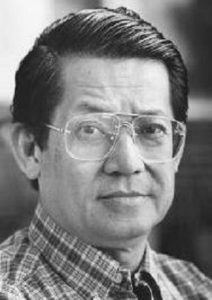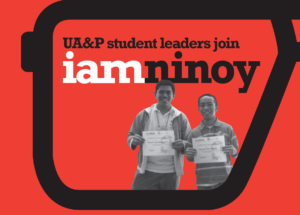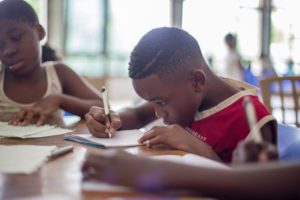This article, originally entitled “UA&P student leaders join iamninoy,” was first published in the January 2009 issue of Universitas.

Wanted: Young people, 16-25 years old, models of integrity, excellence…This call for participants in a leadership conference drew people who weren’t born yet when a modern- day hero—Benigno Aquino, or Ninoy—they are supposed to emulate made a supreme sacrifice for love of country. The Congress—Iamninoy: Connecting Young Filipino Leaders Congress—gave the delegates a deeper knowledge about Ninoy and his passion to serve his fellowmen.
Organized by The Ayala Young Leaders Alliance and the Ninoy and Cory Aquino Center for Leadership, in partnership with the Benigno S. Aquino Foundation, the congress commemorated Ninoy’s 25th death anniversary. Held in the Aquino Museum in Tarlac City last August 22-24, it was a gathering of 100 youth leaders with varied backgrounds, passionately committed to nation-building through leadership in business and entrepreneurship, government, media, arts and creatives, education, and spirituality and formation. They shared and listened to the rich leadership experiences that they have in their own communities, sectors, or schools.
In the congress, two UA&P students made it through the screening process for this event—Samuel Macagba III, a 5th year Development Education student, and John Be Orenz Nito, a 4th year Political Economy student. Here are their notes of experiences and some of the lessons that they want to share with the UA&P community.

‘Stand up and be a leader!’
The challenge of our time: Stand up and be a leader!
We should not depend on one man, We should depend on all of us
And therefore I say, Stand up now and be a leader
And when all of us are leaders, We shall expedite the cause of freedom (Benigno S. Aquino Jr.)
To be honest, my knowledge about Ninoy Aquino was very limited: what I knew, I got from books and my high school history teachers. Because of the Iamninoy congress, now I know more about his charisma and legendary heroism. This has inspired me in many ways. For one, I am inspired to do more and become better. Ninoy started to be a leader at a young age. Being young and inexperienced was never a hindrance for him to take greater opportunities and be the best that he can be as a student and as a leader. During his late 20s or early 30s, he served as a political leader in his community, then as a senator. He continuously expanded his horizon and leaped forward. All of this he offered to his fellow men and the country.
What is most impressive about him, however, is that he acknowledged his own humanness, that is, that he also had weaknesses. He taught us that what we really need to do is to humbly address our failures by developing ourselves in the best way possible. Ninoy said that at the peak of his political career, he thirsted for power and forgot the main purpose of leadership and service. But worse than this, he forgot the main reason for his existence—God. What he exemplified was that even though no one is perfect, everyone is entitled to self-development, which starts from humility and the passion to improve oneself. Everyone has the capacity to be a hero since, as Guillermo Luz—the congress keynote speaker—said, “Heroism starts from a personal transformation of oneself.”

This personal transformation is a constant struggle not just for personal growth but a dedication toward improving society. Every day, all of us are called to be heroes by always going for the principled choices, not the popular ones. Thus, we can persist in this effort only if we are with like-minded individuals who share the same goal of improving ourselves for the common good. As economist Solita Monsod said, “Everything depends on us. Our country can advance only if everyone takes some weight on his or her shoulders.”
As a future educator, I realize the value of my commitment to education. In the 25 seeds of commitment that were produced in this congress, everyone mentioned the importance of education as an instrument to empower others and to push the development of this country.
Believing in the goodness and the capacity of each person, and being inspired by the acts of Ninoy, I continue to learn more about my craft as a student and as a future teacher. My continuing commitment to developing others is lived through my choice of bringing out the best in people and myself because I believe that everyone can be a leader…everyone is a Ninoy in his or her own right.
The death of Ninoy started a war of sustaining development through collective action and personal transformation; and everyone is called to take part in this war. Let us not lose hope and continuously be inspired by the many people who tried their best to push forward what Ninoy and our other heroes have started. The challenge of our time, of this time is no less than be Ninoys! Stand out and be leaders!
– Samuel Macagba III, SED 5th year
Heroes are born, not made
A hundred brave souls—young leaders as they would call themselves—gathered and took the challenge of becoming a hero in their everyday endeavor. The event not only reminded us, the participants, of Ninoy’s heroism, but also inspired us to look at things affecting the country and act upon them as Ninoy would.
At the end of the congress, we, a hundred brave souls, yelled loud and clear “I do what I believe is right. I do what I believe is good. I fight for justice. I fight for freedom…Iamninoy: there is a Ninoy in all of us. And after 25 years, it’s time we play our part…”
Ninoy’s death woke up millions of Filipino people waiting in vain for a hero to do the extraordinary. More than anything else, it left a big responsibility for everyone. Though the ultimate goal of Ninoy, which is to restore peace, freedom, and democracy, was met, his death left a big question about how to continue the unfinished business of selfless service for the country, and for the elusive quest for nation building. Fast track, 25 years after, a hundred young men and women pledged and took the challenge via the “Seeds of Commitment,” which were inspired by the challenges posed by Ninoy’s life and death.
In the congress, we where divided among five different clusters—government, media, education, spirituality, and business—that represent the five different aspects of nation building. After hearing testimonies and lectures, and seeing films about Ninoy, we made action plans that could concretely realize our advocacies in line with the different clusters. The goal for each of us is to be a man for others, a man of service and a man of action, rather than a man with a thousand words—pure talk and nothing else.

Concretely, I made my commitment to serve the Filipino people through public service. Being in the education cluster during the congress, I realized that, although the field of education is the most powerful tool in transforming Philippine society, it is in a dismal and poor state. As a result, my advocacy in life was crafted in my heart: education for the Filipino people—rich and poor, young and old, men and women. Sounds passé…but to me it is an entirely new challenge that I have to rise to. My goal in life now, therefore, is to work for the Philippine government, specifically in the Department of Education.
I chose to enroll in Political Economy in UA&P primarily because I need to get all the necessary tools and knowledge for me to pursue my advocacy. Political Economy therefore is my means to achieve my end goal. Ultimately, I want to take part in the reform of the Philippine education system, seeing it as the only hope for a better Philippines. Meanwhile, I do my course work and push socially and politically oriented causes that can help me grow as a person, a student, and a future leader.
Only after overcoming challenges can we be rightfully called heroes for heroism demands a personal transformation that we could realize only if we truly want it. Then we can truly “walk our talk.”
– John Be Orenz Nito, IPE 4th year
Related articles:
How to make great career choices
Memories of World Youth Day Sydney 2008
Banner photo by GR Stocks on Unsplash.
Leave a Reply